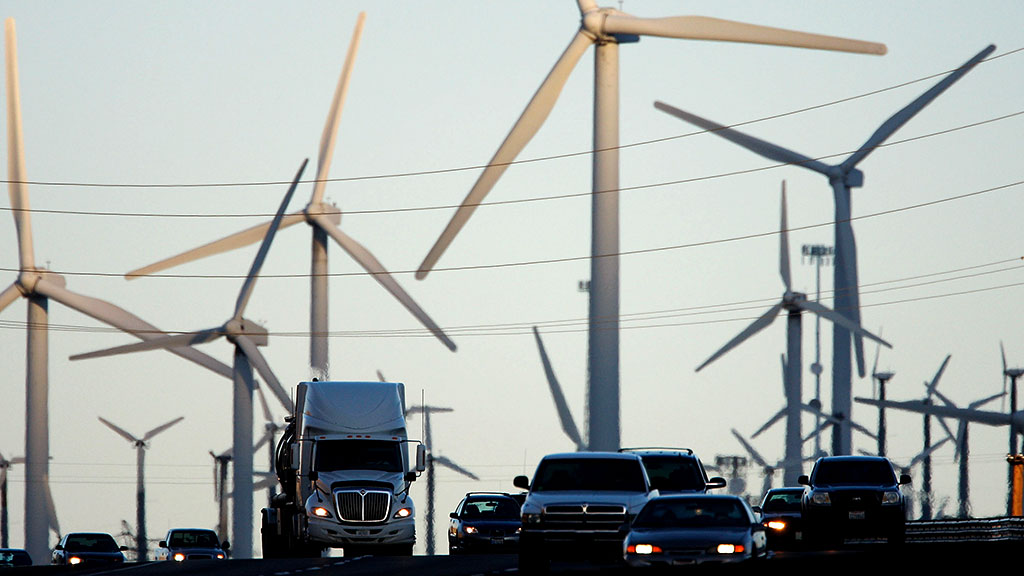The “green” bubble is here. What could burst it?
Renewable energy, electric cars and the demise of fossil fuels – markets have embraced the green revolution with gusto. But there’s bound to be a snapback at some point, says John Stepek, Here’s why.


Get the latest financial news, insights and expert analysis from our award-winning MoneyWeek team, to help you understand what really matters when it comes to your finances.
You are now subscribed
Your newsletter sign-up was successful
Want to add more newsletters?

Twice daily
MoneyWeek
Get the latest financial news, insights and expert analysis from our award-winning MoneyWeek team, to help you understand what really matters when it comes to your finances.

Four times a week
Look After My Bills
Sign up to our free money-saving newsletter, filled with the latest news and expert advice to help you find the best tips and deals for managing your bills. Start saving today!
I like the idea of a “green” future. Who wouldn’t? Put ideology aside for a moment. There is no reason why anyone sensible would prefer “dirty” energy sources to “clean” ones, any more than they’d prefer a beach covered in litter to a clean one.
So this vision of a world where renewables generate electricity cleanly and consistently (with the help of battery storage and smart grids), which is then used to power sleek, reliable electric cars, which are only ever a couple of software upgrades away from being genuinely autonomous? That sounds like a good world to me. It’s getting there that I’m a little more cautious about...
There is a compelling new narrative gripping the markets
My colleague Dominic Frisby often talks about bubbles requiring a compelling narrative. I agree to an extent. It’s a bit chicken and egg for me. Does the story come first, or the cheap money to fund the opportunity? Or is it – like everything else in markets – reflexive?
MoneyWeek
Subscribe to MoneyWeek today and get your first six magazine issues absolutely FREE

Sign up to Money Morning
Don't miss the latest investment and personal finances news, market analysis, plus money-saving tips with our free twice-daily newsletter
Don't miss the latest investment and personal finances news, market analysis, plus money-saving tips with our free twice-daily newsletter
But we’ve certainly seen a compelling narrative take hold in a very short space of time. The narrative is all about saving the world. It’s being fuelled by a great many different things. There’s the tech-utopianism represented by Tesla boss Elon Musk and the other tech billionaires – we can solve anything if we just put our minds and our infinite reserves of zero-cost capital to it.
There’s the active fund management industry, desperate to find a way to market its funds while passive investing is eating its lunch. “ESG” and greenwashing is currently seen as the best way forward.
There are those who are genuinely concerned about the environment. And there are those who see this movement as a good stick with which to beat capitalism. And there are politicians, who always love a bandwagon that enables them to make rousing speeches about long-term policies that some other government can renege on in the future.
There’s the fact that the US is now effectively energy independent, which has really shaken up the power dynamics in the oil market. Crude oil has turned from being "black gold” into being a long-term liability for those dependent on it. Ironic as it is, don’t underestimate how much this has contributed to the drive to look beyond oil.
Anyway, there are lots of drivers behind this narrative. And in the market, the focus is on the companies that are at the vanguard of the new green revolution, and those that are going to be left behind in the dirt. This is why, on the one hand, the energy sector now accounts for less of the S&P 500 than ever before. And on the other hand, you have offshore windfarm specialist Orsted trading on a price/earnings ratio of more than 40, and talking about challenging the oil majors in terms of energy production.
But if one stock could be said to represent “divestment” mania more than any other, it has to be electric car giant Tesla. And to say that Tesla investors are exuberant right now would be understating things. The share price rose by nearly 20% (or one “bull market”, if you take the generally accepted definition) yesterday alone. The stock has already more than trebled since June last year.
There are certainly arguments that things have improved for Tesla: recent results have beaten expectations; Elon Musk has managed to keep his mouth shut for a few months; and any stock with that level of short interest is going to spurt higher when the shorts capitulate. But nearly 300% in under a year? That’s bubble territory. Come on.
In short, I feel that the market is getting over-excited about the demise of fossil fuels. And I suspect there’ll be a snapback at some point.
How could fossil fuels make a comeback?
What could be the catalyst? I can see two possibilities, and one strikes me as being more likely than the other.
One: if global growth starts to look better than everyone expects right now, that would do it. We might hate fossil fuels but we do still need them. Two: it becomes clear that there are more serious obstacles to the adoption of electric vehicles than previously anticipated.
Now, I believe the first is the most likely, certainly in the near term. I do think that the roll-out of electric vehicles will take longer and prove trickier than expected, but I’m pretty sure that in the longer run we’ll all be driving them (I hope we are – it’d be nice to ditch petrol).
So – we’re looking for growth to surprise on the upside. Well, what are the chances of that? Well, what's interesting is that, if we hadn’t had the coronavirus outbreak, then you could make an argument that growth would be looking quite healthy now.
Survey data suggests that the global manufacturing sector – which has been in recession for about a year now – has seen the worst. The most recent data from Germany, which is close to being ground zero for developed-world manufacturing, showed that, while manufacturing was still having a tough time, it’s not as bad as it was.
So the question is this: how long will it take for the coronavirus to pass by as a concern? Obviously, I can’t answer that one. And the short-term hit could be massive. But keep an eye on the headlines and the infection rates. If the progression starts to slow, or an effective treatment is discovered (Thailand is having promising results with various drug combinations apparently) then the market will be able to price in the damage. And then it’ll start to price in the effect of added stimulus. Which is when you’d expect all the hardest-hit assets to start rallying.
So, as I said yesterday, I’d stick with your oil and resources stocks. A good example is oil major BP. It just reported this morning. Earnings fell in the fourth quarter, as you’d expect, because the oil and gas prices fell, which more than offset increased production. However, the figures did beat analysts’ expectations, which is one reason why the share price is up healthily this morning. It probably also helped that the company jacked up its all-important dividend by 2.4% compared to the previous quarter.
I’ll repeat. I think today’s images of a green utopia (or at least, a world with a healthier energy mix) will come true. But everything that we believed about the internet in 2000 also came true. That didn’t stop an investor from being financially ruined if they had bet the house on that future at that point in time.
Get the latest financial news, insights and expert analysis from our award-winning MoneyWeek team, to help you understand what really matters when it comes to your finances.

-
 Should you buy an active ETF?
Should you buy an active ETF?ETFs are often mischaracterised as passive products, but they can be a convenient way to add active management to your portfolio
-
 Power up your pension before 5 April – easy ways to save before the tax year end
Power up your pension before 5 April – easy ways to save before the tax year endWith the end of the tax year looming, pension savers currently have a window to review and maximise what’s going into their retirement funds – we look at how
-
 Key lessons from the MoneyWeek Wealth Summit 2025: focus on safety, value and growth
Key lessons from the MoneyWeek Wealth Summit 2025: focus on safety, value and growthOur annual MoneyWeek Wealth Summit featured a wide array of experts and ideas, and celebrated 25 years of MoneyWeek
-
 The Stella Show is still on the road – can Stella Li keep it that way?
The Stella Show is still on the road – can Stella Li keep it that way?Stella Li is the globe-trotting ambassador for Chinese electric-car company BYD, which has grown into a world leader. Can she keep the motor running?
-
 Tesla seeks approval to supply electricity to UK homes – could it disrupt the energy market?
Tesla seeks approval to supply electricity to UK homes – could it disrupt the energy market?Tesla has applied for a license to supply UK households with electricity, but taking on the biggest providers could prove challenging
-
 Tesla shares slump over Trump/Musk feud
Tesla shares slump over Trump/Musk feudA war of words has sent Tesla shares spiralling to the company’s largest single-day value decline in history
-
 Tesla is no longer the world’s largest electric car maker. Should you invest?
Tesla is no longer the world’s largest electric car maker. Should you invest?Investors need to weigh up the potential of Tesla’s autonomous technology drive against struggles in its core carmaking business when deciding whether or not to invest
-
 Amazon shares fall on profitability concerns
Amazon shares fall on profitability concernsA big increase in capital spending plans compounded an earnings miss for Amazon following its Q4 results
-
 Halifax: House price slump continues as prices slide for the sixth consecutive month
Halifax: House price slump continues as prices slide for the sixth consecutive monthUK house prices fell again in September as buyers returned, but the slowdown was not as fast as anticipated, latest Halifax data shows. Where are house prices falling the most?
-
 Rents hit a record high - but is the opportunity for buy-to-let investors still strong?
Rents hit a record high - but is the opportunity for buy-to-let investors still strong?UK rent prices have hit a record high with the average hitting over £1,200 a month says Rightmove. Are there still opportunities in buy-to-let?